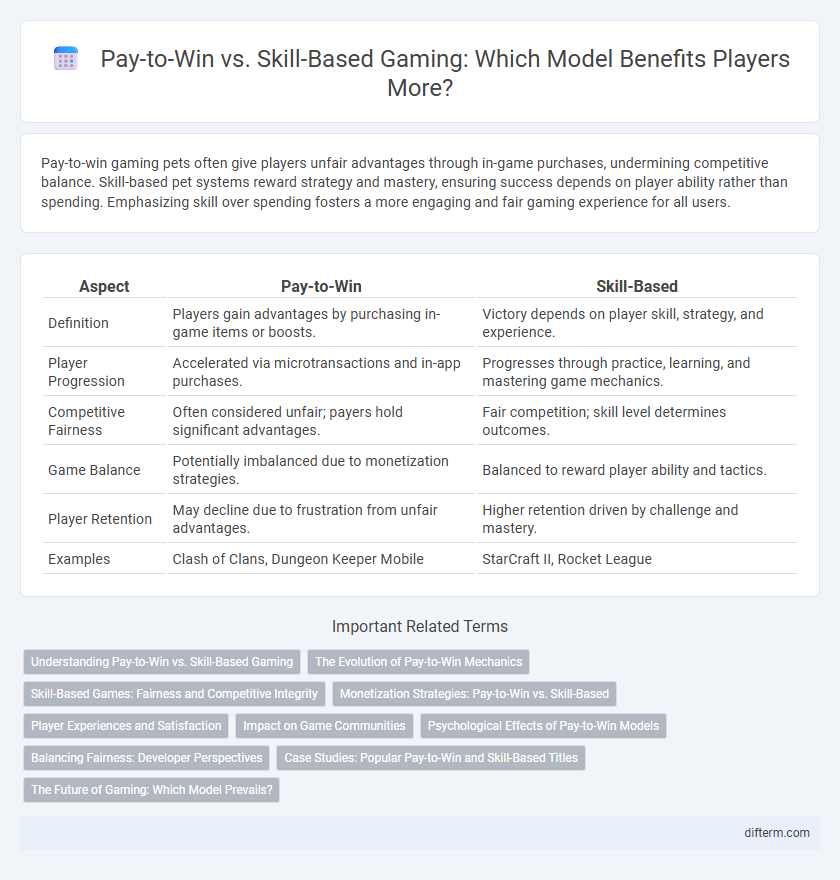Pay-to-win gaming pets often give players unfair advantages through in-game purchases, undermining competitive balance. Skill-based pet systems reward strategy and mastery, ensuring success depends on player ability rather than spending. Emphasizing skill over spending fosters a more engaging and fair gaming experience for all users.
Table of Comparison
| Aspect | Pay-to-Win | Skill-Based |
|---|---|---|
| Definition | Players gain advantages by purchasing in-game items or boosts. | Victory depends on player skill, strategy, and experience. |
| Player Progression | Accelerated via microtransactions and in-app purchases. | Progresses through practice, learning, and mastering game mechanics. |
| Competitive Fairness | Often considered unfair; payers hold significant advantages. | Fair competition; skill level determines outcomes. |
| Game Balance | Potentially imbalanced due to monetization strategies. | Balanced to reward player ability and tactics. |
| Player Retention | May decline due to frustration from unfair advantages. | Higher retention driven by challenge and mastery. |
| Examples | Clash of Clans, Dungeon Keeper Mobile | StarCraft II, Rocket League |
Understanding Pay-to-Win vs. Skill-Based Gaming
Pay-to-win gaming allows players to purchase advantages that can bypass skill and strategy, creating an uneven playing field. Skill-based gaming emphasizes player ability, strategy, and experience, rewarding consistent practice and mastery over random chance or monetary investment. Understanding the impact of pay-to-win mechanics helps gamers choose titles that align with their preferred competitive integrity and fairness.
The Evolution of Pay-to-Win Mechanics
Pay-to-win mechanics have evolved from simple stat boosts purchasable with real money to complex microtransaction systems offering exclusive gear, faster progression, and competitive advantages, often blurring the line between fair play and imbalance. Skill-based gameplay increasingly integrates matchmaking algorithms designed to minimize the impact of paid advantages, promoting meritocracy in competitive gaming. Current trends show developers balancing monetization with player satisfaction by adjusting pay-to-win elements to maintain engagement without compromising core skill dynamics.
Skill-Based Games: Fairness and Competitive Integrity
Skill-based games prioritize player ability and strategy, fostering a competitive environment where success depends on mastery rather than monetary investment. This approach enhances fairness by rewarding dedication and practice, ensuring that victories reflect genuine skill. Maintaining competitive integrity in skill-based games supports a balanced player community and sustained engagement.
Monetization Strategies: Pay-to-Win vs. Skill-Based
Monetization strategies in gaming often contrast pay-to-win models, where players purchase advantages such as powerful items or faster progression, with skill-based systems that reward player mastery and strategy without financial input. Pay-to-win approaches can lead to player frustration and community division due to perceived unfairness, while skill-based monetization fosters competitive balance and long-term engagement by emphasizing player ability. Successful games balance these methods by integrating cosmetic purchases or non-intrusive microtransactions that enhance experience without compromising fairness.
Player Experiences and Satisfaction
Player experiences in gaming significantly differ between pay-to-win and skill-based models, with the latter fostering higher satisfaction through meritocratic progression and fair competition. Skill-based games enhance player engagement by rewarding strategy, practice, and tactical decisions, which builds a loyal community and long-term retention. Conversely, pay-to-win mechanisms often lead to frustration and reduced enjoyment, as monetary investment rather than player ability dictates success, undermining competitive integrity.
Impact on Game Communities
Pay-to-win mechanics often create imbalanced gaming environments, leading to frustration and division within player communities as those willing to spend money gain unfair advantages over skillful players. Skill-based games foster competitive integrity and encourage player growth, resulting in more engaged and cohesive communities. This dynamic influences player retention and the overall health of the gaming ecosystem.
Psychological Effects of Pay-to-Win Models
Pay-to-win models in gaming often trigger frustration and decreased motivation among players who rely solely on skill, as monetary investment can overshadow genuine ability and effort. This dynamic cultivates a sense of unfairness and undermines long-term engagement, leading to potential player churn and negative community sentiment. Studies indicate that skill-based systems foster higher player satisfaction and retention by rewarding mastery and strategic thinking rather than financial expenditure.
Balancing Fairness: Developer Perspectives
Game developers emphasize balancing pay-to-win elements with skill-based mechanics to maintain fairness and player engagement. Implementing transparent progression systems and equitable reward structures helps prevent monetization from undermining competitive integrity. Regular player feedback and data analytics guide adjustments ensuring a well-rounded gameplay experience.
Case Studies: Popular Pay-to-Win and Skill-Based Titles
Clash of Clans exemplifies a pay-to-win model where players can purchase resources to gain competitive advantages, often overshadowing skill-based progression. In contrast, games like League of Legends emphasize skill-based mechanics, rewarding strategic thinking and player dexterity without in-game purchases directly affecting competitive fairness. Case studies reveal that skill-based titles tend to sustain higher long-term engagement and eSports viability compared to pay-to-win games, which may face community backlash and declining player retention.
The Future of Gaming: Which Model Prevails?
The future of gaming increasingly favors skill-based models as competitive integrity and player satisfaction drive industry trends, with leading developers investing in balanced gameplay and anti-cheat technologies. Pay-to-win mechanics face growing backlash from communities demanding fairness and reward for genuine talent, prompting a shift towards monetization through cosmetic enhancements and season passes. Data from recent market analyses indicate that games prioritizing skill over pay-to-win elements sustain higher player retention and long-term revenue growth.
pay-to-win vs skill-based Infographic

 difterm.com
difterm.com